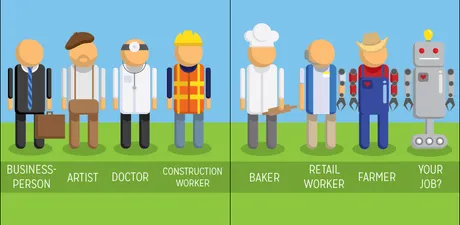
Efficiency has gotten us to where we are today.
It's become very clear that we don't need more of the same.
In Oregon it is illegal to pump your own gas because that's how badly the state needs jobs. By increasing efficiency in a centralized manner, the people in charge refuse to share their wealth with the less fortunate. Tell those freeloaders to get a job, amirite?
Wrong
There are no jobs left, so the government creates jobs that shouldn't exist. These jobs get paid peanuts because they should have been phased out forever. However, they can't be phased out because distribution of resources in abysmal under the current regime.
Distribution
We can provide food, water, shelter, and healthcare to everyone on the planet, but we choose not to. You know there is a problem when restaurants are throwing away food by the dumpster-full while people are starving on the streets. You know there is a problem when we pay farmers not to grow food because supply would flood the market and crash the price. You know there is a problem when you get sick and the only treatments offered are ones that are extremely overpriced. You know there is a problem when kids come home from school and all they learned was how to be dependent on the system.

GMO
Modifying the genetics of plants is not a bad thing. It is the corporations and motivations behind them that we shouldn't trust. Being able to modify biological code an amazing advancement that could change the world. Imagine if we created a plant that that turned sunlight into raw electricity.
Solar panels that you can grow? Yeah, sign me up. Is it really such a stretch? Plants are already doing this, they just use the energy for other purposes. Now, let's count all the ways why stuff like this isn't happening.
Who in their right mind would ever want to pump billions into R&D for a project that can't be monetized? There are thousands of technologies out there like this that would benefit the entire planet, but because they are too easy to steal and too hard to profit from they never happen. No one wants to give the world free energy; especially not Big Oil, who makes their living enslaving the planet through petroleum dependence and warfare.
Crypto
It's only a matter of time before a GMO coin surfaces and starts doing open-source research and development. All of the limitations of, "Can we centrally control this project to profit from it," goes away. Anything with value will be created regardless of business model.

Jobs
Back to the point of this post, inefficiency is exactly what we need. The government already knows this and shows it by creating redundant jobs that shouldn't exist. However, with crypto, the jobs absolutely must exist.
Imagine trying to decentralize food production. You lose all the efficiency of having a huge centralized farm. The same thing is true for decentralizing software development, government, construction, etc. This movement is going to require a lot more people working on it initially, providing jobs for all the citizens that have been displaced by centralized efficiency.
However, we must assume that the decentralized movement quickly begins automating itself. This automation will displace jobs once again. However, this time around the resources produced by said automation will be actually be distributed fairly to the community instead of directly to the top of the pyramid (UBI?). This will give a very generous buffer to citizens looking for a new job or simply looking to retire early. Redundancy will be eliminated without hurting the working class using superior systems of decentralized distribution.
Quality
Decentralization increases quality. Smaller operations produce better products and cut less corners. This is especially true considering this movement will allow people to work where they want to work, when they want to work, without a boss breathing down their neck. The value of morale in the workplace can not be understated.
Artificial Scarcity
With decentralization comes a free market untethered by the restrictions and regulations of the traditional economy. When no one is in charge there is no one to sue, no one to jail, and no one to shut down. Crypto will regulate itself, citizens will opt in to the governance that suits them the best. Products can not become artificially scarce because there will always be a community willing to undercut an unfair market. The only artificially scarce assets remaining will be crypto itself by design.

Robust systems on a local scale
Just recently there was an Outbreak of E. coli Infections Linked to Romaine Lettuce. Hundreds of businesses were effected. Things like this can't happen when production is decentralized. Not only does a smaller operation have a lower chance of having an outbreak caused by cutting corners for a profit, but also each outbreak will be contained to a small subsection of the overall grid. It's like building the Titanic, except this time it actually is unsinkable.
In addition, many more products will be available locally, meaning the cost of transportation goes down, and the number of jobs available in an area increases.
Community Representation
How many communities out there have no representation in the cryptoshpere? Pretty much all of them. Pick any project be it Bitcoin, Ethereum, EOS, Steem, Binance, Golem, etc. These are all new communities that were formed around the crypto. There are no cryptocurrencies out there yet that are targeting already established communities.
What happens when someone creates a coin that gets airdropped onto particular minorities in a certain region? What happens when crypto gets airdropped on all citizens of a country or all employees of a corporation? There is a completely untapped gold mine out there that is smart-money, and we are sitting on the < 1% line.
Conclusion
Smart money is here, and the smarter it gets the more everyone on the planet benefits. Fiat is like a very reliable desktop calculator; boring but sometimes useful given the context. Crypto is like a smart phone with no apps on it; pointless for the average user but brimming with potential.
Variables like centralized automation combined with the next financial crisis are going to make good hardworking people incredibly desperate. They will be pushed into the cryptosphere with open arms. These people will be willing to work very hard for little pay. At first, life will be very difficult, but after a while the fruits of that labor will pay off. Inefficiency will be converted into trust, and trust will be far more valuable than anything the current establishment has to offer.
The thing that can't scale is centralized power.
Crypto can scale near infinetly in comparison.
Return from Inefficiency Is A Good Thing to edicted's Web3 Blog
